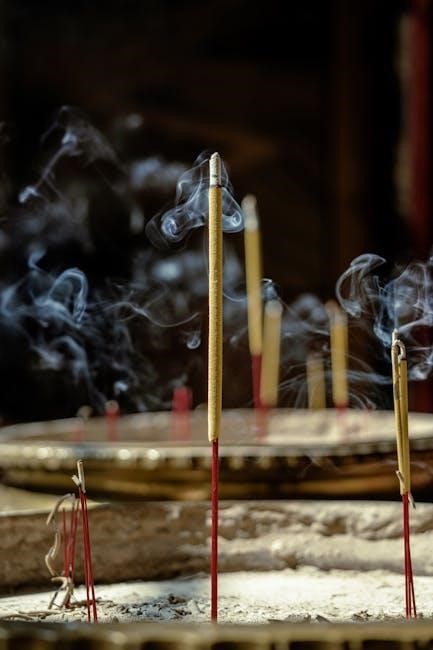The Janaza Prayer is a sacred Islamic ritual performed for the deceased, emphasizing communal obligation and spiritual reflection. It includes specific duas and four Takbirs, with detailed guides available in PDF formats to ensure proper execution.
Overview of Janaza Prayer
The Janaza Prayer is a congregational Islamic funeral rite performed for the deceased, consisting of four Takbirs (declarations of “Allahu Akbar”) and specific duas. It is a communal obligation, emphasizing unity and seeking forgiveness for the departed. The prayer is performed standing, with no prostration or bowing, and is followed by burial. Detailed guides, including PDF resources, outline the procedure, ensuring correctness and adherence to Islamic traditions. It reflects the community’s collective responsibility and spiritual support for the deceased.
Importance of Dua in Janaza Prayer
Dua (supplication) holds profound significance in the Janaza Prayer, as it seeks forgiveness, mercy, and blessings for the deceased. Recited collectively, it embodies the community’s spiritual support and intercession. The Imam leads the congregation in specific duas, such as Allahum-maghfir li-hayyina wa mayyitina, reflecting unity and devotion. These supplications, rooted in the Sunnah, are essential for the deceased’s soul, emphasizing the importance of communal prayer and sincere intent.
Procedure for Performing Janaza Prayer
The Janaza Prayer involves four Takbirs, each followed by specific supplications. The prayer is performed standing, without bowing or prostration, emphasizing communal supplication for the deceased’s forgiveness and mercy.
Step-by-Step Guide to Janaza Prayer
Begin with the first Takbir, reciting Subhanallah. Then, recite the Thana. After the second Takbir, recite Al-Fatihah and a portion of the Quran. The third Takbir is followed by Dua for the deceased. Conclude with the fourth Takbir, a final supplication, and end with Salaam to the right and left. This structured approach ensures the prayer is performed with dignity and adherence to Islamic traditions, seeking mercy for the departed soul.
Significance of Four Takbirs in Janaza
The four Takbirs in Janaza Prayer symbolize glorification and submission to Allah. Each Takbir serves a purpose: the first initiates prayer, the second follows Thana, the third precedes Dua, and the fourth concludes the prayer. This structure emphasizes seeking forgiveness for the deceased and aligns with Sunnah practices, ensuring a focused and reverent supplication for the departed soul’s mercy and guidance in the afterlife.
Specific Dua Recitations During Janaza
Specific Duas are recited during Janaza Prayer to seek forgiveness for the deceased. The primary Dua includes Allahummaghfir lihayyina wa mayyitina, imploring mercy for both the living and the dead. Additional supplications, such as Istighfar (seeking forgiveness) and Durood (blessings on the Prophet), are also recommended. These Duas are outlined in Janaza Prayer PDF guides, ensuring correctness and adherence to Sunnah practices for the benefit of the deceased and the congregation alike.
Significance and Obligation
Janaza Prayer is a communal obligation (Farz Kifayah) in Islam, emphasizing the importance of collective duty. It highlights the spiritual rewards for participants and the deceased.
Janaza as a Communal Obligation (Farz Kifayah)
Janaza prayer is a communal obligation, known as Farz Kifayah, meaning it is mandatory for the Muslim community to perform if at least one capable individual attends. This duty underscores the importance of unity and collective responsibility in Islam. The community ensures the deceased receives proper rites, reflecting the Prophet’s teachings on caring for one another. PDF guides provide detailed instructions for performing this obligation correctly.
Spiritual Benefits and Rewards
Participating in Janaza prayer brings immense spiritual rewards, including forgiveness and mercy from Allah. It reflects the community’s care for the deceased and earns blessings. The Prophet (PBUH) emphasized that performing Janaza prayer seeking forgiveness for the deceased is a noble act. Reciting specific duas from PDF guides enhances the supplication’s effectiveness, benefiting both the living and the departed.

Necessary Conditions
Purity and Wudu are essential for performing Janaza prayer. The deceased must be washed and shrouded, and the prayer should be offered in a clean, appropriate environment.
Purity and Wudu Requirements
Purity and Wudu are essential for the validity of Janaza prayer. All participants must perform Wudu prior to the prayer. The deceased must be washed and shrouded according to Islamic guidelines. These practices ensure the prayer’s sanctity and reflect respect for the deceased. Observing these conditions is crucial for fulfilling the communal obligation.
Appropriate Clothing and Cleanliness
Appropriate clothing and cleanliness are vital for Janaza prayer. Participants should wear modest, clean attire, reflecting respect for the occasion. Avoiding fancy or decorative clothing is recommended. The deceased must be shrouded in simple, clean garments. Cleanliness of both body and clothes is essential to maintain the prayer’s sanctity. These practices ensure the dignity and solemnity of the funeral rites, aligning with Islamic teachings and community standards.

Common Mistakes to Avoid
Common mistakes include incorrect dua recitation and performing the prayer during prohibited times. Adhering to proper practices and consulting reliable PDF guides can help avoid these errors.
Mistakes in Dua Recitation
Common errors in dua recitation during Janaza Prayer include incorrect or incomplete recitation of specific supplications. Mispronouncing Arabic words or omitting key sections, such as the dua for the deceased, can occur. Some mistakenly recite personal duas instead of the prescribed ones, while others may skip essential parts altogether. Deviating from the Sunnah-recommended duas is another frequent oversight. Using a reliable PDF guide can help ensure accuracy and adherence to proper traditions.
Prohibited Times for Janaza Prayer
Janaza Prayer should not be performed during sunrise, sunset, or when the sun is at its zenith (Zawaal). These times are considered Makruh, meaning disliked in Islamic tradition. However, exceptions exist in cases of necessity, allowing the prayer to proceed to avoid significant delay. Adhering to these guidelines ensures the prayer is performed in accordance with Islamic etiquette and Sunnah practices, as outlined in various PDF resources and guides available online.

Role of the Muslim Community
The Muslim community plays a vital role in performing the Janaza Prayer collectively and offering dua for the deceased, fostering unity and shared responsibility.
Community Participation in Funeral Rites
Community participation in Janaza Prayer is essential, as it reflects collective responsibility and solidarity. Muslims gather to perform the prayer, ensuring the deceased receives a dignified farewell. The four Takbirs are recited together, symbolizing unity and shared obligation. This communal act strengthens social bonds and demonstrates compassion.
Active involvement includes preparing the body, attending the prayer, and offering condolences. Such collective efforts embody the Islamic value of caring for one another, fulfilling a communal duty, and seeking divine mercy for the departed soul.
Collective Supplication for the Deceased
Collective supplication during Janaza Prayer is a heartfelt practice, seeking forgiveness and mercy for the deceased. The community unites to recite specific duas, such as Allahummaghfir lihayyina wa mayyitina, emphasizing compassion and spiritual support. These supplications, often detailed in PDF guides, foster a sense of unity and shared responsibility among believers, ensuring the departed soul is commended to Allah’s mercy.

PDF Resources and Guides
Janaza Prayer PDF resources are widely available, offering detailed guidance on performing the ritual, including duas, step-by-step procedures, and the significance of four Takbirs, making them invaluable for learners.
Availability of Janaza Prayer PDFs
Janaza Prayer PDF resources are readily available online, offering comprehensive guides on performing the prayer, including duas, step-by-step procedures, and the significance of four Takbirs. These PDFs can be downloaded for free from official Islamic websites, eBook platforms, and mobile apps, providing easy access to learners and practitioners alike. They often include Arabic texts, translations, and explanations, ensuring clarity and proper execution of the prayer.
Benefits of Using Printable Guides
Printable Janaza Prayer guides offer numerous benefits, including easy access to duas, step-by-step procedures, and proper etiquette. They provide a structured format for learning and performing the prayer, ensuring accuracy and focus. These guides are especially helpful for educating those unfamiliar with the ritual, fostering community participation, and maintaining consistency in practice. Their portability and clarity make them indispensable for both individuals and groups seeking to perform the prayer correctly and with devotion.
Cultural and Regional Variations
Janaza prayer practices vary across cultures, influenced by regional traditions, yet core Islamic principles remain consistent. Printable guides help maintain authenticity and uniformity in diverse cultural settings.
Differences in Funeral Practices Worldwide
Funeral practices vary globally, reflecting cultural and regional traditions. Some communities incorporate local customs while performing the Janaza prayer, ensuring adherence to Islamic teachings. Printable PDF guides help maintain uniformity in dua recitation and prayer procedures, bridging cultural gaps and preserving Islamic principles. These resources are invaluable for Muslims navigating diverse funeral rites worldwide.
Influence of Cultural Traditions on Janaza
Cultural traditions significantly influence Janaza practices worldwide, blending Islamic rituals with local customs. For instance, some communities incorporate specific supplications or recitations, while others observe unique burial practices. Despite these variations, the core principles of the Janaza prayer, including the recitation of duas and the performance of four Takbirs, remain unchanged. Printable PDF guides often accommodate these cultural nuances while ensuring adherence to Islamic guidelines.
Recited Dua and Supplications
The Janaza prayer includes specific duas and supplications, such as Allahummaghfir lihayyina wa mayyitina, seeking forgiveness for both the living and the deceased. PDF guides provide these supplications in Arabic and translations for ease of recitation.
Specific Dua for the Deceased
- Allahummaghfir lihayyina wa mayyitina (O Allah, forgive our living and our dead).
- Dua for forgiveness and mercy for the deceased.
- Supplication for ease in the afterlife.
These duas are integral to the Janaza prayer, seeking divine pardon and comfort for the departed soul. PDF guides often include these supplications in Arabic with translations for easy recitation.
Recommended Supplications from the Sunnah
- Allahummaghfir lihayyina wa mayyitina (O Allah, forgive our living and our dead).
- Dua for forgiveness and mercy for the deceased, seeking ease in the afterlife.
- Supplications from the Prophet’s teachings, such as praying for the deceased with sincerity and compassion.
These supplications, rooted in the Sunnah, emphasize seeking divine forgiveness and mercy for the departed soul, aligning with Islamic traditions and values. PDF guides often include these recommended prayers to facilitate proper recitation during the Janaza rites.
Sunnah Practices in Janaza
The Janaza prayer follows Sunnah practices, including specific duas and the recitation of four Takbirs, as taught by the Prophet Muhammad (PBUH). PDF guides detail these rituals for accurate observance.
Following Prophet Muhammad’s Teachings
The Prophet Muhammad (PBUH) established the Janaza prayer as a vital Sunnah practice. He emphasized performing four Takbirs, reciting specific duas, and maintaining proper etiquette. PDF guides outline these steps, ensuring followers adhere to his teachings precisely. This includes making dua for the deceased and avoiding prohibited times for prayer. These practices reflect the Prophet’s compassion and guidance, ensuring the community honors the departed rightly.
Etiquettes and Manners During Prayer
During the Janaza prayer, it is essential to maintain proper etiquette and manners. Worshippers must stand in straight lines, face the Qiblah, and ensure silence. The imam leads the prayer, and the congregation follows diligently. Avoiding distractions and showing respect are crucial. Specific duas and supplications are recited with focus, reflecting the Prophet’s teachings. These practices ensure the prayer is performed with the dignity and reverence it deserves. PDF guides provide detailed instructions to uphold these etiquettes.
The Janaza Prayer is a vital Islamic ritual, emphasizing communal obligation and spiritual reflection. Proper execution, including specific duas and four Takbirs, ensures the deceased receives maximum benefit. PDF guides provide comprehensive instructions, facilitating understanding and performance. By adhering to these practices, Muslims honor the departed and uphold Prophetic traditions, fostering unity and faith within the community. These resources are invaluable for maintaining the purity and significance of the Janaza Prayer.